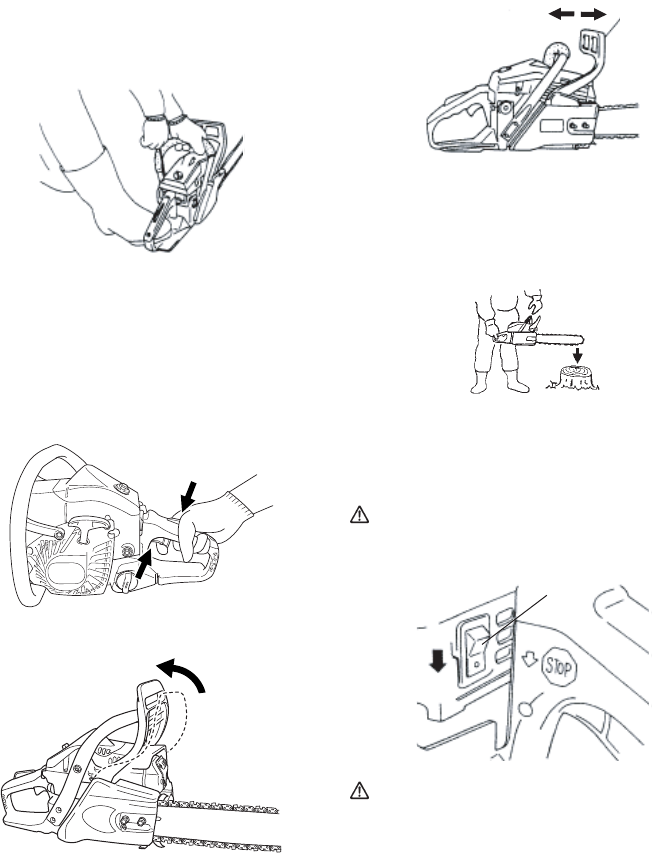
8
3. Pull recoil starter briskly, taking care to keep the handle in your
grasp and not allowing it to snap back. (Fig. 13)
4. When you hear fi rst ignition, return the choke to run position.
(Fig. 12)
5. Pull recoil starter briskly again in the aforementioned manner.
(Fig. 13)
Fig. 13
NOTE
If engine does not start, repeat procedures from 2 to 5.
6. As soon as engine start, pull throttle lever full once and release
immediately. (Fig. 14)
Then half-throttle is disengaged. Make sure chain brake is
disengaged. (Fig. 15)
Allow the engine about 2-3 minutes to warm
up before subjecting
it to any load.
Do not run the engine at high speed without the load to shorten
the longevity of the engine.
Fig. 14
Fig. 15
Chain brake operation (Fig. 16)
Chain brake (18), if so equipped, is designed to activate in an
emergency such as kick-back action. Please check to verify that it
works properly before use.
Application of brake is made by moving the front guard towards the
bar. During the chain brake operation,
even if the throttle lever is
pulled, the engine speed does not increase and the chain does not
turn. To release the brake, pull up the chain brake lever.
18
Fig. 16
How to confi rm:
1) Tu rn off the engine.
2) Holding the chain saw horizontally, release your hand from the
front handle, hit the tip of the guide bar to a stump or a piece
of wood, and confi rm brake operation. Operating level varies by
bar size.
Fig. 17
In case the brake is not eff ective, ask our dealer for inspection and
repairs. If the engine keeps rotating at high speed with the brake
engaged, the clutch will overheat causing trouble.
When the brake engages during operation, immediately release the
throttle lever to stop the engine.
WARNING
Do not carry the machine with the engine running.
Stopping (Fig. 18)
Decrease engine speed, and push ignition switch (15) to stop
position.
15
Fig. 18
WARNING
KICKBACK DANGER (Fig. 19)
One of the most severe dangers when working with a chain saw is
the possibility of kickback. Kickback may occur when the upper tip
of the guide bar touches an object, or when the wood closes in and
pinches the saw chain in the cut. Tip contact
in some cases may
cause a lightning fast reverse reaction, kicking the guide bar up and
back toward you. Pinching the saw chain along the top of the guide
bar may also push the guide bar rapidly back towards you. Either of
these reactions may cause you to lose control
of the saw which could
result in serious personal injury. Even though your saw has safety
built into its design, you should not rely on these safety features
exclusively. Know where your bar tip is at all times. Kickback does
occur if you allow the kickback zone (19) of the bar
to touch an object.
Do not use that area. Kickback from pinching is caused by a cut
closing and pinching the upper side of the guide bar. Study your cut
and make sure it will open as you cut through. Maintain control when
the engine is running by always keeping
a fi rm grip on the saw with


















